Enough of clogged water pipes, burst water heater, and dappled glasses. Stop tolerating your dried-out skin/hair just because of hard water. Soften your household water and solve these problems in one go.
The most fruitful method for softening hard water is using ion exchange softeners. It will provide you with soft water for fulfilling your household needs.
Are you interested in learning more about how to soften hard water? We promise to guide you ahead and confide you with various laundry, kitchen, and bathing hard water solutions.
So, just keep reading.
How to Soften Hard Water Naturally For Laundry? [5 Effective Methods]
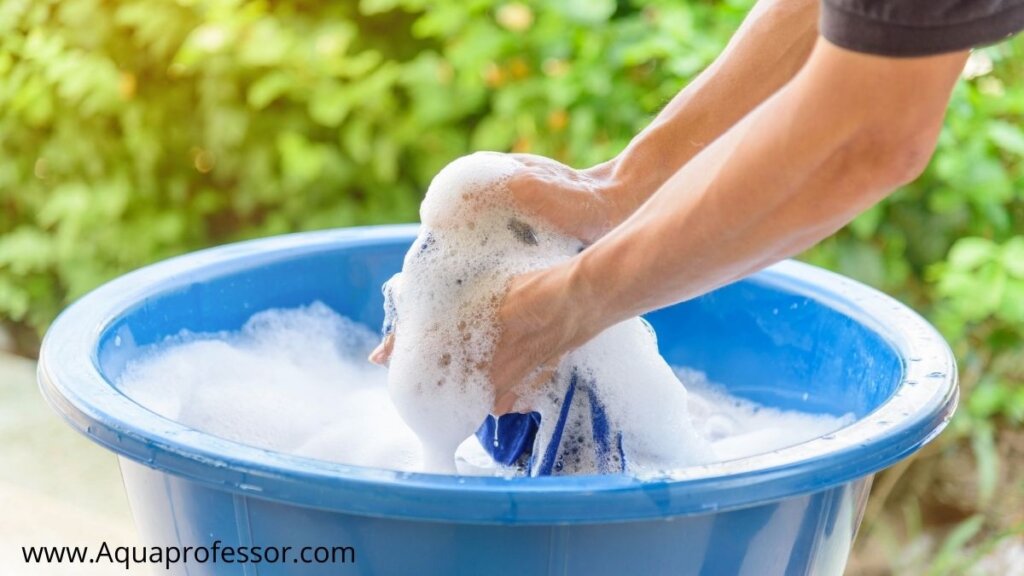
Before we dive into the solutions, let’s understand why we need to soften water for laundry in the first place.
Problems Caused By Hard Water in Laundry
Methods For Softening Water For Your Laundry
Now, let’s look into this table which beautifully summarizes 5 effective methods for softening water for your laundry:
| Methods | How effective? | Whether easily accessible? | Cost of using the method |
| Distilled white vinegar | Very effective. | Yes, both in offline and online stores. | $9-$13 |
| Washing soda | Very effective | Yes | $9.5-$15 |
| Laundry borax | Very effective | Yes | $5-$10 |
| Non-precipitating ion-exchange water conditioners | Super effective | Yes | $400-$2500 |
| Use a low-pH detergent and wash in warm water | Effective | Yes | $10-$13 |
Also Read: How To Dechlorinate Tap Water For Drinking, Plants And Fish [New Guide]
#1 Distilled White Vinegar
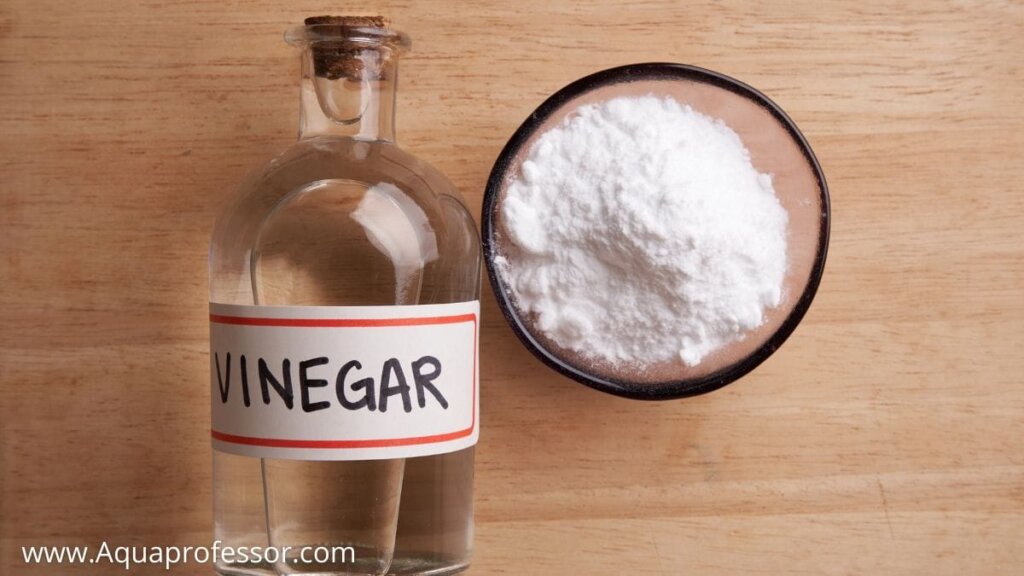
I use this substance to save my laundry clothes from hard water stains. It removes all the hard water white spots, makes my stiff towels soft again, and bleaches some of my fabrics.
How To Use It:
How Effective Is It?
Distilled white vinegar effectively treats hard water spots on your fabrics.
Is It Easily Accessible?
You will quickly get this product online as well as offline.
Its Cost:
It’s cost-effective and demands only $9-$13 from you.
#2 Washing Soda
This natural water softener melts the hard water soap scum wherever you want. Your detergent gets an extra cleaning and freshening ability through it.
How Do I Use It?
How Effective Is It?
It softens your laundry’s hard water very effectively.
Is It Easily Accessible?
Yes, it is easily accessible in both offline and online markets.
Its Cost:
This product costs only $9.5-$15.
Also Read: 7 Effective Methods To Fix Cloudy Tap Water
#3 Laundry Borax
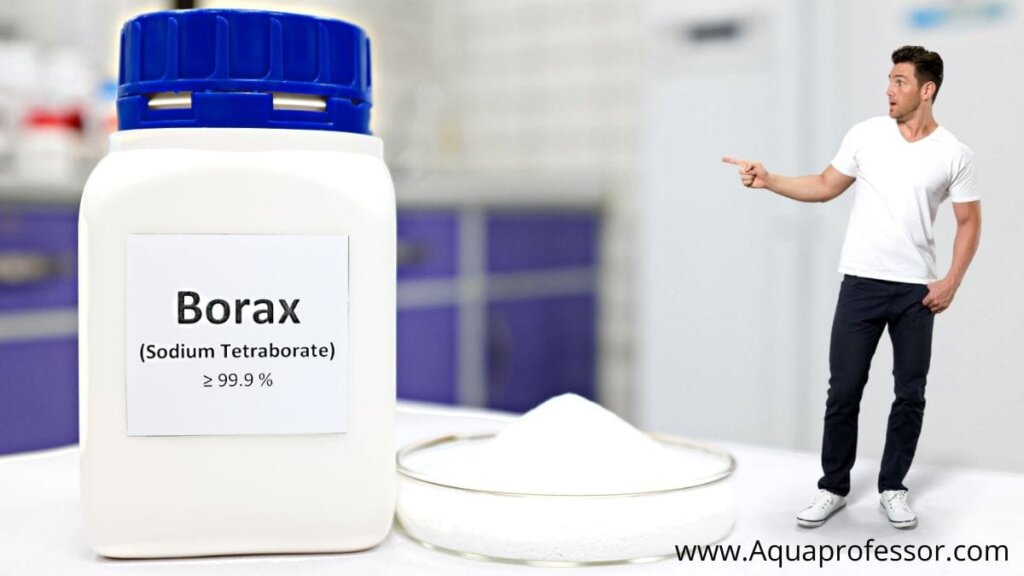
This water softener gives a good surfactant performance.
How To Use It?
How Effective Is It?
It’s effective enough for softening your laundry’s hard water.
Is It Easily Accessible?
Yes, you can get it quickly in stores.
Its Cost:
This product has a price range of $5-$10.
#4 Non-Precipitating Ion-Exchange Water Conditioners
It gives a permanent solution to your laundry’s hard water.
They are of 2 Types:
How To Use It?
These machines generate softened water instantly by refilling themselves automatically.
Its Effectiveness:
Sodium conditioners are a super effective and lasting solution that prevents the hardness of water (works better along with a RO water system) and generates softer water.
But, unlike the potassium conditioners, they deposit additional sodium into the water, posing health risks for patients with a low-sodium or sodium-restricted diet.
Is It Easily Accessible?
Yes, you can easily get it from online and offline stores.
Its Cost:
An ion exchange softener costs from $400-$2500.
#5 Use A Low-pH Detergent And Wash In Warm Water
A low-pH detergent aids in dissolving minerals and removes hard-water buildup.
Its Effectiveness:
This method effectively worked for me.
Accessibility And Cost:
You can easily get this product anywhere, from $10-$13.
How To Soften Hard Water Naturally For Kitchen [3 Simple Methods]

Hard water also poses problems for kitchen use.
Problems Caused By Hard Water In Kitchen
Methods of Water Softening in Kitchen
| Methods | How effective? | Whether easily accessible? | Cost of using the method |
| Boiling | Only for temporary hardness | Yes (only gas and utensils needed) | Free (you will pay gas bills anyway) |
| Use Bottled Water [for drinking] | Effective | Yes | $1-$1.9 |
| Invest in a portable ion exchange filter | Effective (combined with a RO system) | Yes | $51-$200 |
Also Read: 7 Reasons Why My Tap Water Is Brown When I Turn It On
#1 Boiling
Boiling water can beat temporary hardness by removing some unwanted minerals.
How Effective?
The process removes temporary water hardness and is, therefore, less effective. It may not work for all.
Accessibility & Cost?
Yes, the ingredients of this method (utensil, gas stove) are easily accessible, and the process is free of cost.
#2 Invest In A Portable Ion-Exchange Water Softener
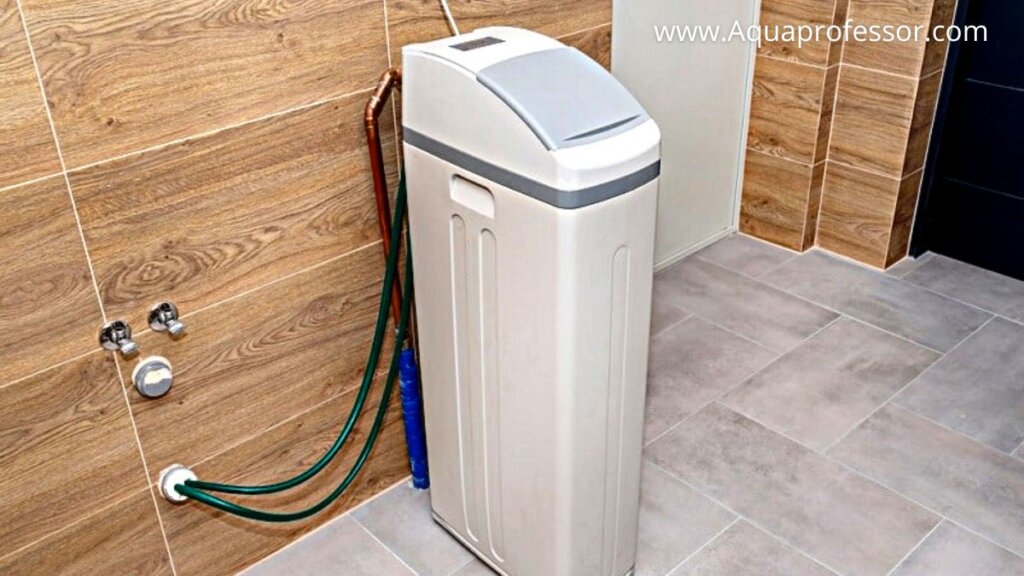
This water filter gives your water a better taste by filtering hard water minerals.
How Effective?
Individually, the device is less effective but becomes effective if a secondary filter comes into play.
Accessibility & Cost:
The device is easily accessible and costs between $51-$200.
Also Read: The Honest Review Of Fleck Iron Pro 2 In 2024
#3 Use Bottled Water [for Drinking]
Bottled water generally comprises soft water. They comprise low levels of minerals like calcium and magnesium and thus, taste good.
How Effective?
They are effective for drinking or general use and can be used as a substitute for tap water. However, the bottles’ plastic is bad for the environment.
Accessibility & Cost:
Bottled water is easily available and costs $1-$1.9.
How To Soften Hard Water For Bathing: 5 Easy & Practical Solutions
Problems Caused By Hard Water in Bathroom
Methods of Water Softening in the Bathroom
| Methods | How effective? | Whether easily accessible? | Cost of using the method |
| Add baking soda | Most effective | Easily available in offline and online stores. | $8-$17 |
| Add vinegar | Very effective | Yes | $9-$13 |
| Add bath salts | Supremely effective | Yes | $4.50-$30 |
| Use baby oil [surprising method] | Very effective | Yes | $5- $29 |
| Invest in shower head filter/baby cleansers [best for baby bathing] | Very effective | Yes | $27-$95 (for shower head filter) $4-$10(for baby cleanser) |
#1 Add Baking Soda
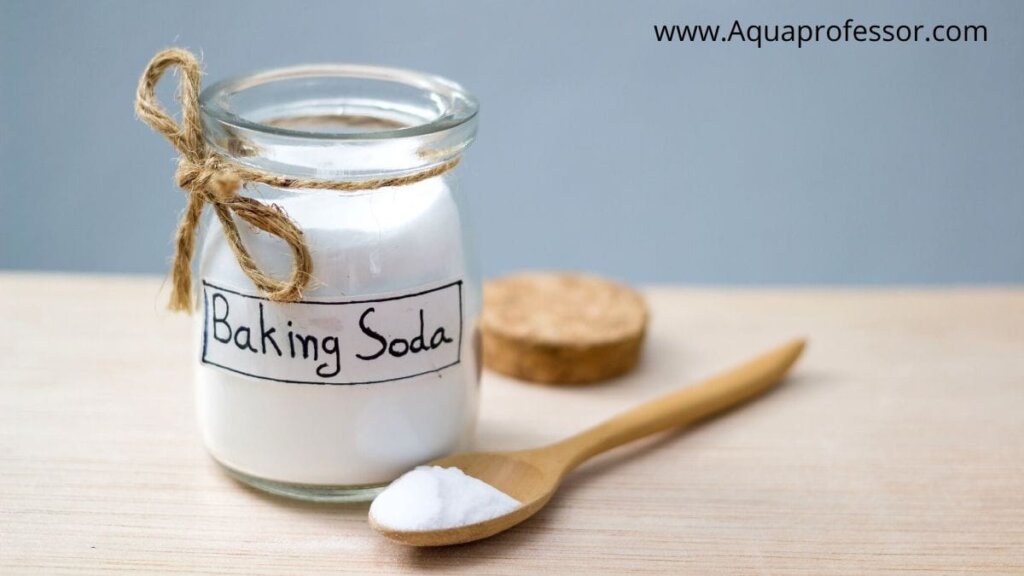
It Removes Your Ceramic Tiles’ Stains.
How Effective?
It completely removes the tiles’ stains and thus is one of the most effective methods.
Accessibility & Cost:
Get baking soda from either offline or online stores for $8-$17.
#2 Add Vinegar
This safe and all-natural home cleaner combats readily hard water stains.
Its Effectiveness:
It removes hardware stains much more effectively and prevents them from occurring again.
Accessibility and Cost:
You can buy vinegar from any shop for $9-$13.
#3 Add Bath Salts
Epsom bath salts remove the toughest hard water stains when combined with water and baking soda.
How Effective?
They are super effective with a fascinating smell.
Accessibility and Cost:
Being easily accessible, it costs $4.50-$30.
Also Read: Can You Drink Shower Water Safely?
#4 Use Baby Oil
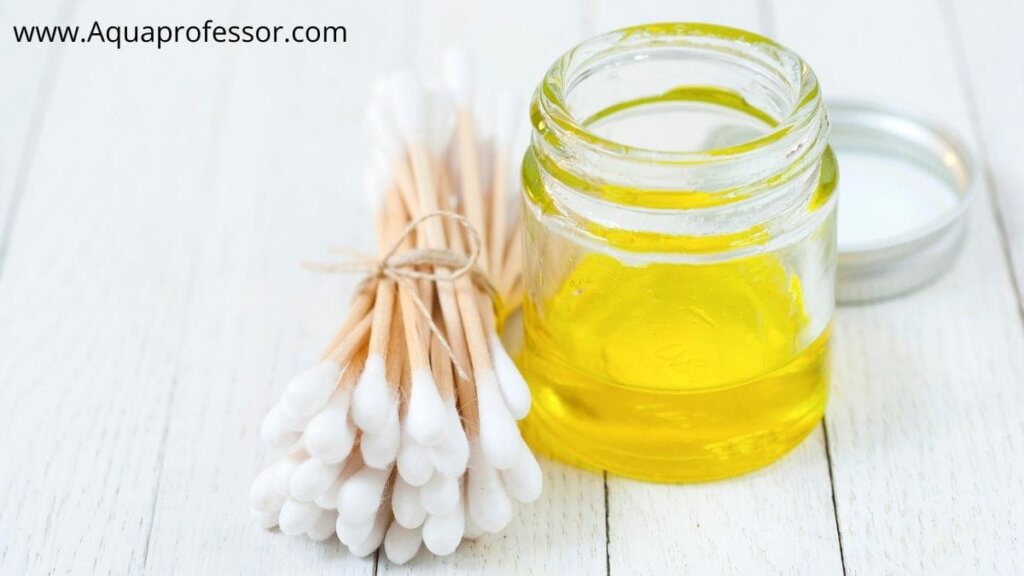
Baby oil makes your dry skin and hair oily again.
How Effective?
It’s very effective for treating dry skin and hair.
Accessibility and Cost:
You can get it easily online/offline for $5- $29.
#5 Invest In Shower Head Filter/Baby Cleansers [Bath Water Softener]
Both shower head filters and baby cleansers remove heavy metals and contaminants like chlorine to improve your bathing water quality. They change the hard water to soft water. Baby cleansers also reduce free calcium ions by 40 percent.
How Effective:
Both are very effective and prevent your skin’s/hair’s dryness by removing the mineral buildup from your bath water.
Accessibility and Cost:
Both are easily accessible. A shower head filter costs $27-$95, and a baby cleanser from $4-$10.
How Do I Know If My Water Is Soft Or Hard: 5 Signs To Spot
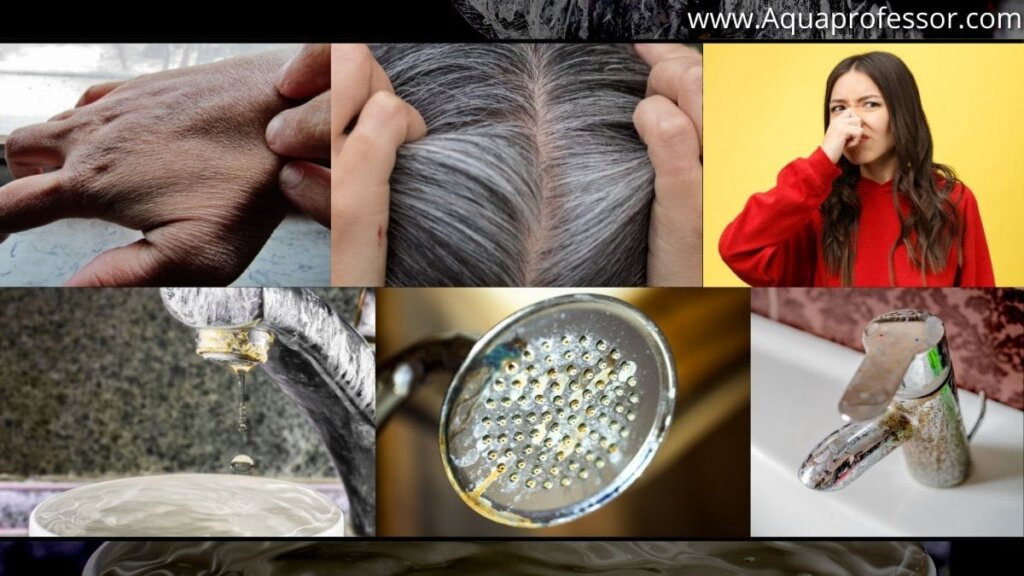
Here are 5 Signs of Hard Water that I Experienced at my Home:
Also Read: 6 Reasons Why Your Filtered Water Tastes Weird [+How To Fix]
Household Water Softening FAQs

1. Should I soften all the water in my house?
Softening water at one’s house is their personal choice.
However, softening prevents hard water damage to your household objects, skin, and hair.
2. Is a water softener worth it?
Yes, the water softener is beneficial as it solves many water-related problems in your house. It saves your money.
3. Can you soften your water too much?
Intense water softening is not recommended as it adds too much sodium to your water, which is harmful to individuals having high blood pressure.
4. How often should you soften water?
You can soften the water every 2 to 3 days. However, a functioning water softener softens water daily (multiple times).
5. Do water softeners waste water?
No, water softeners are highly efficient and prevent water wastage. Rather, your cleaning tasks with hard water results in water wastage.
Adarsh is a Health & Nutrition Sciences graduate with expertise in environmental health. He is associated with ventures like Glacier Fresh Filter and Simpure Filter Systems. Through Aqua Professor, he intends to provide helpful information to every home to help them make smarter decisions.
